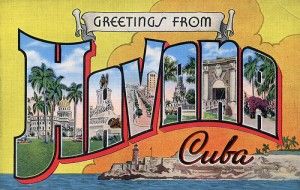FPPC shuns investigation of CA legislators’ Cuba trip
By John Hrabe and Katy Grimes
After Friday’s report on CalWatchdog.com that at least two state legislators traveled to Cuba with a powerful Sacramento lobbyist, you’d think the state’s political watchdog might be launching a formal investigation. After all, the trip was hosted by the same lobbyist that reached a $500,000 settlement in 2010 with then-New York Attorney General Andrew Cuomo over allegations of pay-to-play practices in that state.
Lawmakers haven’t answered any questions, and won’t face any scrutiny from the state’s ethics watchdog, because they claim to have paid for their own expenses.
“We are not investigating the Cuba trip,” confirmed Gary Winuk, chief of the Enforcement Division at the Fair Political Practices Commission. “If someone violated the current laws and regulations, then we will pursue it.”
The FPPC’s failure to investigate the matter rests on legislators’ claim to have paid their own trip expenses. It’s perfectly legal for lobbyists to escort legislators on foreign junkets, away from any public scrutiny, or the ability to independently verify legislators’ claims.
New details
To date, it still isn’t clear which legislators were in Cuba, their purpose of traveling to a foreign country with a lobbyist, or why they’ve refused to release any information about the trip itinerary, which they claim wasn’t a secret. Only State Sen. Cathleen Galgiani, D-Livingston, and Assemblyman Katcho Achadjian, R-San Luis Obispo, have been willing to confirm to CalWatchdog.com that they spent the spring holiday in Cuba with lobbyist Darius Anderson, the president and founder of Platinum Advisors.
The state’s ethics commission might not be asking any questions, but new details are slowly emerging about the trip thanks to local media reports. The San Luis Obispo Tribune, in a follow up to CalWatchdog.com’s piece, confirmed that there were eight state lawmakers on the Cuba trip.
“It is also important to note that the delegation included seven other members of the Legislature, nonprofit staff, as well as other business leaders,” Achadjian told his hometown paper in defense of his trip to a foreign country with a registered lobbyist. “It was not a personal trip with a lobbyist as it was described in other news outlets, nor was it done in secret.”
That raises the question: if the trip wasn’t a secret, why do the identities of six legislators remain a mystery?
 Not talking to CalWatchdog.com
Not talking to CalWatchdog.com
A spokesman for Galgiani said the government office doesn’t have any information on the Cuba trip and that the senator isn’t willing to comment.
Achadjian’s office was even less forthcoming with us, only telling CalWatchdog.com to read other media reports. “Earlier today the assemblyman was happy to answer a series of questions regarding his participation in the delegation trip to Cuba,” said Craig Swaim, chief of staff to Achadjian. “You are free to use that as a reference for your reporting.”
He added: “As for [who] else participated in the delegation trip, you may wish to contact Californians Building Bridges or member offices directly, as I only speak on behalf of Assemblyman Achadjian and not for other members of the Legislature.”
Achadjian’s staff was referring to the Tribune’s report, which included Achadjian’s declaration that the trip wasn’t a secret.
It isn’t clear whether the legislators used campaign or personal funds to pay for trip expenses. Under state law, it wouldn’t make a difference.
Influence
One campaign watchdog group believes that lobbyists and legislators shouldn’t be traveling together, regardless of who pays the bill because it gives lobbyists more influence than average citizens.
“We are in an era where powerful lobbyists have more access to public officials than constituents. Look no further than these trips as proof,” said Phillip Ung, a policy advocate for California Common Cause, a non-profit, non-partisan citizens’ lobby organization. “These junkets must either end or voters should know who is on the trip and what is being discussed regardless of who pays for it.”
Ung said that California’s weak ethics regulations don’t meet the federal government’s disclosure requirements for members of Congress that engage in foreign travel.
“Congress banned travel junkets with lobbyists years ago and now requires strict disclosure before a privately funded trip can even take place,” Ung said.
Campaign funds
“From trips across the ocean, gifts to staff, and even cars, many elected officials feel there is no real restriction for what they can spend their campaign funds on,” said Ung. “Under current law this is legal because of the vague definitions that allow campaign funds to be spent on almost anything under the sun.”
Not everyone in Sacramento is critical of the lobbyist-legislator foreign travel issue. Dan Pellissier, the president of California Pension Reform, defended the trip to Cuba based on his own experiences on a similar trip organized by Anderson’s nonprofit, Californians Building Bridges.
“I do not know what happened on other CBB trips, but ours was an outstanding experience without a hint of secrecy or impropriety,” Pellissier told CalWatchdog.com. “It was a wonderful personal experience for both of us and I cannot imagine a more meaningful cultural exchange. I tipped well, in U.S. dollars.” Pellissier also wrote similar comments after the first CalWatchdog.com article on the trip.
All of this means that entertainers Beyonce and Jay-Z, who also recently traveled to Cuba, have faced more scrutiny than state lawmakers traveling to the same place with the state’s “best-connected” lobbyist. Two members of the U.S. Congress from Florida, Reps. Ileana Ros-Lehtinen and Mario Diaz-Balart, have demanded answers from the State Department’s Office of Foreign Assets Control Department of Treasury about the superstars’ trip. No word yet on whether the Florida members of Congress will demand a similar investigation into Achadjian and Galgiani.
CalWatchdog.com is currently contacting every member of the State Assembly to confirm their whereabouts over the spring holiday.
Related Articles
Drunken deputies on the job
Steven Greenhut: The police officer who gives you a speeding ticket or DUI might be drunk, according to the Los
Scientist says no reason to shut down San Onofre nuke plant
Can the San Onofre Nuclear Generating Station, whose decommissioning was announced last June, be salvaged? Cal-Tech trained geochemist and
The economics of football stadiums
CalWatchdog.com has run several stories on the National Football League’s maneuvers with the Los Angeles market, which currently doesn’t have a





